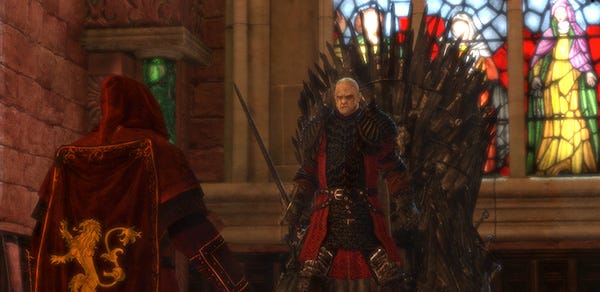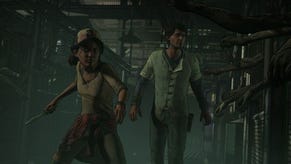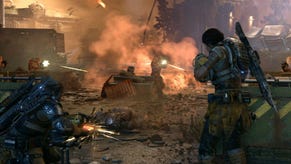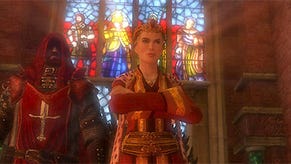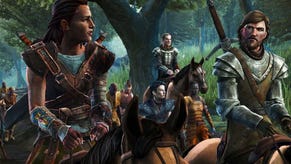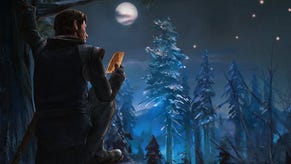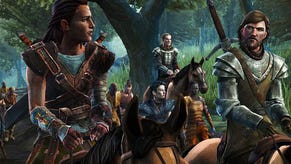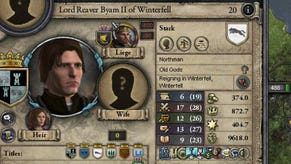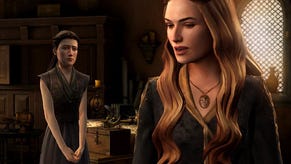Wot I Think: Game Of Thrones
You win or you quickload
Edit - I've been asked to note this this piece is based on the US version of the game, as published by Atlus and available for a couple of weeks now. Despite there being no oceans in the middle of the internet, the UK version, published by Focus, is mysteriously not available until June 9.
Cyanide's RPG based on the Game of Thrones TV show has consumed the last week of my life. But should I have allowed this song of stats and fire so much time on my screen and in my mind? We shall Cersei...
It goes on far too long, seems to reach a climactic conflict repeatedly but then pull back from it in favour of more stringing along and treats its characters as utterly disposable. In other words, it's faithful to the source material in an intrinsic way, not merely a stylistic one. Cyanide's Game of Thrones: The Roleplaying Game is a slow-burner with a deeply awkward opening and besieged by footballer in a pizza advert levels of voice-acting, but it builds carefully, cleverly and dramatically.
It's made from two key ingredients: a fleshed-out and surprising narrative that weaves in and out of the events of the first Song of Ice & Fire book/season of the TV show without either disrupting them or being undermined by them, and combat that blossoms from stilted beginnings into highly tactical crowd control. Also, stealth missions starring a psychic dog. It's grand and sprawling and silly and brutal and will make about as much sense as a sheep wearing a tie to anyone not reasonably au fait with the books or TV show, and it's a hard sell for sure. It might also be the most fascinating mainstream game I've played this year.
Before I tell you quite why that is - oho, ain't I the tease? - let me give you the broad strokes. It's a roleplaying game (more talking than action) which runs roughly parallel to the first book/series of Game of Thrones/A Song of Ice and Fire. While a few established characters make an appearance and most of the others are mentioned, it is the self-contained tale of two newly-created heroes. Mors 'Old Russell Crowe' Westford is a bitter, brutal man of the Night's Watch, investigating skullduggery among the lost souls who guard the towering Wall that protects Westeros from invading Wildling forces. Down South, Alester 'Non-racist Mel Gibson' Sarwyck is the self-exiled heir of Riverspring, now a fire-obsessed devotee of the Lord of Light returning to his castled homestead to attend his father's funeral. More skullduggery is inevitably discovered, and ultimately it ties into the trail Mors is following.
This being Game of Thrones - and not just lip service to it - everything is connected, everyone is lying to everyone and no-one is safe from blade. Least of all the most virtuous. Given how much existent material it has to tie into yet never step on the toes of, the writing does a remarkable job of being its own, self-contained and surprisingly affecting tale while still finding some natural gaps to slide neatly into. There are certainly points where it's near-impossible to believe that Mors and Alester's activities, and the nature of some of their allies, could have gone entirely unobserved and unremarked upon by the books/show, but for the most part it avoids being fanfic or grotty embellishment. Its Mors and Alester's story. There's plenty I could spoil, but I'll leave it at saying they're not operating in the vacuum they first appear to be. That's good, in that it's satisfying to be part of the bigger picture after all, and bad in that the game will struggle to function as standalone entity for those who don't know the show/books well. Mors and Alester might not be in Game of Thrones, but they are very much in the game of thrones. As such, you know full well what their options are.
Critically, their tale, as it blossoms and unravels and shocks and elongates far past what I'd imagined, is compelling. That it achieves this without any Tyrion or Joffrey or Ned or Hodor (Hodor!) deserves great applause. That it achieves this despite being often undermined by voice acting your mum could do a better job of deserves a standing ovation.
The guy voicing ever-angry Mors is a fascinating example of the game's greatest triumph and greatest failing. For around the first half of the game - which means at least 15 hours unless you're really rushing - he's pretty bad. Not dreadful, but stilted, a bit disengaged, clearly reading straight from the script and focusing more on the growly effect than on getting the emphases right. Past a certain point, he improves exponentially. One of his climactic speeches, all fury and passion unleashed at last after decades of torment, had me almost mesmerised. True, it never becomes a performance for the ages, but it seemed so strongly to me - and here I am merely theorising - that, past a certain point, the actor twigged that was he was reading wasn't the turgid, waffling drek he might have suspected it to be when he took the job after all. That, in fact, it truly deserved his all.
Alester, by contrast, never reaches either the lows or highs of Mors, being generally a workmanlike but likeable performance which fluffs a few dramatic moments. Meanwhile the major villain, Alester's vengeful half-brother Valarr, seems to be having a whale of time alternating between boo-hiss-baddie and coolly charismatic deceiver, but the supporting cast, the assorted soldiers, thugs and civilians of Westeros, are too often atrocious. Voices can change entirely mid-conversation, the same handful of people recur with different faces time and again and the vast majority sound like they're recording a video telling their parents that everything is fine and they've being taken good care of while their kidnapper holds a gun to their heads. Given how conversation-centric this game is, it's so disappointing that top-notch performances weren't one of its highest priorities.
The relationship between Mors and Alester is the lynchpin of the game, as is how they complement each other in battle. GoTRPG frankly takes too damned long to reunite these former brothers in arms, long absented from each other, and a big chunk of their alternating solo levels in the run up to it feels lonely and sometimes dull. The upside of this error is a pulsing excitement/tension when one of them finally arrives in the same place you know the other to be. Both armed with key, scandalous information that only you, the player, as yet know interconnects, they're going to meet. But on what terms, in what state and on which sides?
My excitement at that point was immediately undercut by the huge fear that the game would resort to the bait and switch tactics so commonly employed by Game of Thrones author George R.R. Martin. How many times has that big beardy tease taken us to the very brink of key characters meeting or reuniting, only to (often brutally) pull the rug out from under them? To its eternal credit, it realises we really do deserve this pay-off after all these long hours of lonely trudging and doing other people's chores for them. The Getting The Gang Back Together Moment is the cavalcade of excitement, realisation and bloody vengeance it needed to be, even despite the best worst efforts of the supporting cast.
In fact, while GoTRPG is certainly over-long and saddled with flabby bits it doesn't need, by and large it's a capsule version of most of the Ice and Fire saga's major beats (dragons, deserts, wights and Blackwater-esque naval battles being the notable exceptions) but with a focus and completeness that the increasingly resolution-dodging books do not by their current tome five of a planned seven. Some unnecessary wibble and boring side-quests aside, it is clear that this game was built around a carefully-planned, start-to-finish tale. One with true, not Mass Effect 3-style, multiple endings, too. In terms of narrative and tone, the Witcher games are a comparable touchstone. It's grimy and bloody, everyone's a rotten bastard, death lurks around every corner and politics is a far more powerful and frightening force than magic. No sex scenes here mind, though there are a couple of entirely unconvincing brothels staffed by identi-faced and -voiced non-nude robo-women.
Where GoTRPG most significantly differs from The Witcher - and indeed the vast majority of contemporary RPGs - is the combat. It's neither real-time or turn-based, instead roughly orbiting the pause-tactics method employed by the likes of Baldur's Gate and Dragon Age. Despite being resolutely a third-person, shoulders-in-your-face affair that would appear to suggest frenzied hacky-slashy banality, it actually goes beyond, say, Dragon Age, in that pause-time orders are essentially mandatory for the full duration of every fight. Sure, once in while you can lazily survive leaving your hero(es) to lazily auto-stab a lone enemy, but for the vast majority of the time you're outnumbered and will wind up looking like so much armoured salami within seconds unless you fight with wits as well as your blade or bow.
Here's an example. My Alester is primarily an archer, though right at the beginning of the game I could have opted to make him a swordsman or an assassin-type instead. If he's faced with three enemies - which tends to be the norm - by default they'll swamp him and stab him to death really very quickly. So, I tap space, plunging the game into slow-motion (not true pause, and if you linger for too long you'll get thumped). I use an ability which throws an immobilising powder at anyone standing in a 120 degree arc in front of me. This enables me to step back to where the attackers can't reach me.
For my next trick, I hit space again and switch to my second weapon set, which uses blunt-tipped 'crushing' arrows which are 15% more effective against plate armour. I then set my arrow on fire, from a three-dose flask of flammable liquid I carry. I then, with the last of my energy bar, unleash quick shot on one enemy. Hit space to resume, he takes a bunch of damage and catches on fire. The immobilising powder wears off, and they all charge over to me again. While they do that, I'm either tapping 9 or drinking some water to recovery energy, so that by the time they're upon me I hit space again and knee one of them (not the wounded one) in the groin. He doubles up, bleeding from places I don't want to think about. If Mors were with me at this stage, he could take advantage of that bleeding to inflict bonus damage. He's not alas, so instead I use my detonate ability, which causes a small explosion around the guy on fire. That's enough to finish off him and nearly take out the guy with the bleeding balls.
At this point, I'm out of energy again, and receive a couple of very damaging stabs. One more means death. In space bar mode again, I neck some Milk of the Poppy to replenish a little health, and last long enough that there's sufficient energy for another Immobilise. A standard, zero-energy attack takes out the injured guy, and now it's a matter of intermittently immobilised cat and quickshotting mouse on the lone survivor.
This sequence probably took about twice as long to play as it did to read, and more of it was spent in the pause-time than in watching the bloodshed play out. It's also just one of several ways I could have approached that fight, and those in turn are just the ways that electing to make Alester an archer offered. Throw Mors into the mix, or as is the case in the first half of the game, temporary companions whose skills and gear can't be altered, and it becomes yet more elaborate. Your two characters' abilities complement each other, primarily by creating stunlock or damage over time effects which their companion's skills can make the best of, but the enemy numbers and toughness generally increases to ensure that you can't focus on just one of your guys while leaving the other to do whatever.
True enough, the combat can be samey despite this. There isn't an enormous range of abilities even if there are options, you're almost exclusively up against identikit guards in light, medium or heavy armour and with either melee or ranged weapons, plus the energy bar is too limited to allow using your full box of tricks in any given single fight. But it is truly tactical and thoughtfully balanced, and for that reason it's spared from the hollow relentlessness it might have had as a straight-up action game even in stretches where the fighting can become too routine.
Alongside that is Mors' dog. He's a Skinchanger, perhaps too overtly and neatly so given the mystique and discomfort with which this ability is depicted in the books/show, which means he can issue direct commands such as knock down or disarm to his hound during fights, and that he can possess it outside of them. This entails a sort of scent-following, stealth-attack mini-game that's mandatory at times and just a means of finding bonus loot at others. Frankly, it's not a great mini-game - it's thoroughly inflexible about which enemies can and can't be taken out, and the QTE required for a successful throat-rip is long and tedious, but it is welcome variety and entails a few stealth-puzzles. Especially in terms of breaking up what otherwise might feel like interminable wandering about confusingly laid-out castles bashing guards every 50 metres.
There is, sadly, quite a lot of trudging around similar-looking places full of arbitrary barriers. At a guess I'd put this down to budgetary restrictions - as I would a few bewildering moments when key events such as all-out battles happen off-screen - which is one reason that the game's much longer than it needs to be. I clocked up over 40 hours, and that's with a few side quests left unfinished. You could do it in much less than that, but coping with the later, quite challenging fights does necessitate being high-level, so I suspect rushing means a hard time.
As for the thorny matter of linearity, I'd say GoTRPG gets this more or less right. Quests happen in a set order and there are long stretches when you're trapped in one area, but much of the time you can dive out to revisit shops or characters in other areas, as well as tackling one of the few but lengthy side-quests.
On top of that, there's a steady stream of dialogue choices which have genuine bearing on later outcomes as well as immediate ones. It does tend to polarise into Talk 'Em Round Or Take 'Em Out, but that's enough to afford a decent degree or roleplaying. Broadly, Alester can puppeteer as a man of peace and patience or a silver-tongued deceiver, and Mors a stoic man of duty or a merciless puritan, while both generally have the option of blood-crazed vengeance. It works well, and even despite the wobbly acting there's a strong sense, especially in the second half of the game, of really inhabiting these characters. And, if you play it like I did, fighting to stop them yielding to their worst behaviours.
There's much left to both praise (the loot/gear system is well balanced, avoids excess and neatly themed to the various houses and banners of Westeros) and criticise (the broad depicting of women as victims or whores; the occasional open use of magic somewhat conflicts with the book, or at least the state of the world before the arrival of the red comet) but it's time to do what George R.R. Martin will not and conclude. He makes a cameo appearance, incidentally, but unfortunately his acting is on a par with his respect for deadlines.
In short, it's a troubled roleplaying game but also a really interesting and strong one. Every misfire is met by a triumph of some sort, and the one thing it is not is a lazy, perfunctory cash-in. It's an epic that doesn't quite have the budget to be an epic, but strives its hardest to be one nonetheless. It's much more like the kind of experience I'd hoped for from Risen 2, which sadly turned out to be a stereotype-laden exercise in hollow jolliness. This is thoughtful, heavy with a sense of consequence and impressively nasty even despite stylistic and apparent budgetary failings. After the woeful Genesis, it's also Cyanide very much making good on the huge license they lucked into.
